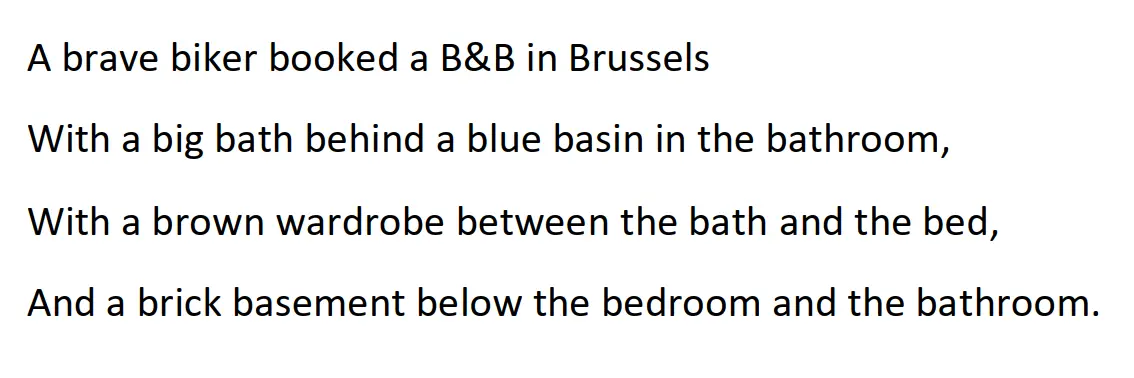Tongue-twisters with sound “B”
Want to improve pronunciation, intonation, and rhythm? I have an idea
Learn English
Learning
Tongue-twisters with sound “B”
Want to improve pronunciation, intonation, and rhythm? I have an idea
Which of the buildings will be a bit bad?
Tongue-twisters are a fun and effective way to help students learn English. They can be used to improve pronunciation, intonation, and rhythm. Here are some examples of tongue-twisters that teachers can use in the classroom:


Let your students fantasize! Of course, none of the buildings will be a bit bad because the color of the bricks does not determine the quality of the building! Yet, this tongue-twister can help students practice the "b" sound, as well as intonation and rhythm.
What about brave bikers?
Training with tongue-twisters can be a helpful tool for improving your speech clarity, as well as your overall language skills. Tongue-twisters can be challenging to say correctly, which requires you to pay close attention to the sounds and rhythms of the words. Let’s try the one about the brave biker!


When you practice tongue-twisters, you train your mouth, tongue, and vocal cords to produce sounds accurately and quickly, which can help you to communicate more effectively in English. Additionally, practicing tongue-twisters can improve your listening skills, as you learn to distinguish between similar sounds and variations in pronunciation.
Bees, beetles and butterflies
However, it's important to remember that tongue-twisters are just one tool among many that you can use to improve your language skills. It's also important to practice speaking in everyday situations, such as conversations with native speakers, and to seek feedback from others on your pronunciation and speech clarity. Try to find a mentor and repeat the following tongue-twister about a special present.


The tongue-twister suggests that the Brothers Bean bought two blue boxes, one containing brown beetles and the other containing beautiful butterflies. The question asks which blue box is a bit bigger, but since the tongue-twister doesn't provide any information to suggest that one of the blue boxes is larger than the other, it can be assumed that both blue boxes are of the same size. Therefore, the answer to the question is that neither of the blue boxes is a bit bigger.
Big Boss
Tongue-twisters are a cultural phenomenon that can be found in many different cultures and languages around the world. They are a form of traditional oral literature that has been passed down from generation to generation, often through children's games and rhymes. Here is one of the rhymes dedicated to a Big Boss.


The tongue-twister doesn't provide any information about why the big boss became bored with the Berlin branch of the bank. It only states that the big boss did become bored and decided to book a break on the beaches of Biscay Bay. Therefore, we can only speculate about the reasons why the big boss became bored and decided to take a break. It's possible that the big boss was experiencing work-related stress, dissatisfaction with the Berlin branch's performance, or simply needed a change of scenery.
Complex tongue-twisters
In some cultures, tongue-twisters have developed into elaborate games and competitions, with participants trying to outdo each other with their ability to say the most difficult and complex tongue-twisters. In other cultures, tongue-twisters are used as a form of verbal art, with skilled performers reciting tongue-twisters with precision and skill.


The question remains opened. It goes without saying that teachers can also challenge their students to create their own tongue-twisters using different sounds, words, and phrases. This can be a fun and engaging way to practice pronunciation and improve language skills.
Previous article
Next article
Previous article
Next article
You might also like: